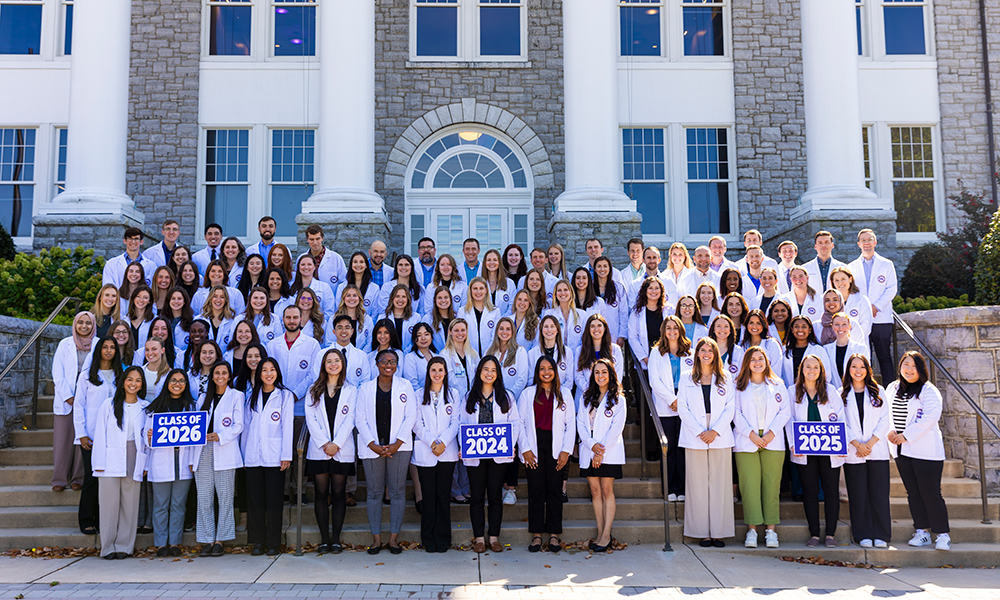PA Student Society receives $10,000 grant to support Suitcase Clinic
College of Health and Behavioral Studies
The JMU Physician Assistant Student Society (PASS), a student-run organization of Physician Assistant Studies students committed to civic and community engagement, was selected as the recipient of the 2024 IMPACT Grant from the PA Foundation, a subsidiary of the American Academy of Physician Assistants.
The IMPACT grant provides funds for PA student involvement in “programs that improve health” and support “patient-centered, community-based health projects,” according to the PA Foundation website. As a grant recipient, PASS will receive $10,000 to support the Suitcase Clinic, a healthcare organization dedicated to improving the health of homeless individuals and shelter residents in the Harrisonburg area.
PA student Jordan Andre came across information about the grant and approached Sharon Maiewski, Physician Assistant Studies professor and Director of the Suitcase Clinic, about applying. As Suitcase Clinic director, Maiewski had experience with grant writing and drafts of previous grant applications that helped guide the students in completing their application.
“This was a student-initiated project,” said Maiewski. “They’re the ones who really got it done.”
Although the Suitcase Clinic was previously overseen by the School of Nursing, Maiewski took over as director about three years ago, and CHBS students who are preparing to enter the medical field (including nursing and PA students) work regularly with patients at the clinic.
“By taking compassionate and trauma-informed medical care directly to homeless shelters, the Suitcase Clinic helps patients circumvent barriers [to healthcare] so their medical needs can be more easily addressed,” said Andre.
“Suitcase Clinic was first conceived by nursing educators and their students from JMU and EMU in 2009,” said Maiewski. “They noticed in the community that year that there was a lot of influenza going around, and that for people who were homeless, there wasn’t much support for them.” With the help of a multitude of community partners, they formed a coalition, acquired funding and in June of 2011 packed suitcases with medical supplies and began visiting various shelters to provide healthcare.
“That’s the same model we have today,” said Maiewski, about the Suitcase Clinic. Now, the clinic goes to Open Doors, Salvation Army, Our Community Place, Asbury Methodist Church, Gemeinschaft House, and Safe & Secure Homeless Respite regularly to provide these services.
The IMPACT grant will allow the Suitcase Clinic to expand its services parallel to the opening of the Navigation Center by Open Doors, a new facility for the organization set to open in November of this year.
“[The Navigation Center] will be a shelter at night, and then open in the daytime for services that anybody in Harrisonburg can access,” said Maiewski. “There will be a food pantry, counseling services, housing services – and we’ll be there, too,” she said, about the Suitcase Clinic.
The new center will include two exam rooms, which is more space than the Suitcase Clinic has historically been able to utilize as a mobile healthcare service.
Along with expanding the services to which Open Doors can provide access, the Navigation Center will also expand their capacity from about 40 individuals to 80. “This grant is going to help us get our supplies up, so we are able to take care of nearly double the previous population,” said Maiewski.
“We can use this grant not only to support general clinic operations, but also to get students more involved in the Suitcase Clinic,” said Maiewski.
For clients using the clinic’s services, the grant’s objectives include minimizing unnecessary use of emergency services by Suitcase Clinic patients, establishing pathways for routine prevention screenings and interventions, offer assistance in identifying and achieving wellness goals, and overall gaining better health and wellness so they might also obtain housing, employment and further opportunities that improve their life circumstances.
For students, the goals are to help them establish relationships with high-need patients, experience firsthand how social conditions impact health and understand the complex needs of homeless people after they are discharged from the hospital. The PA program prioritizes student engagement throughout the curriculum.
“After they finish anatomy and physiology and learn to do a physical exam, they jump right into clinics,” said Maiewski. “Several students have said they come to JMU because of this program. They want to get out into the community before they start their clinical year. Here, they get out into the clinics early, so they become more comfortable and get more out of their clinical year.”
“The PA program is involved with the Suitcase Clinic as part of the program’s curriculum through the “Student Engaged Medical Clinic (SEMC),” said Andre. “The SEMC is an opportunity for PA students to gain clinical experience in the didactic year. Students gain not only clinical experience, but also learn much about professionalism, culturally competent care, and social determinants of health.”
“Through all their interactions, the hope is for students to consider the social determinants of health, adverse childhood experiences, and other aspects that impact people’s health outcomes, and what steps can be taken to improve those outcomes,” said Maiewski.
